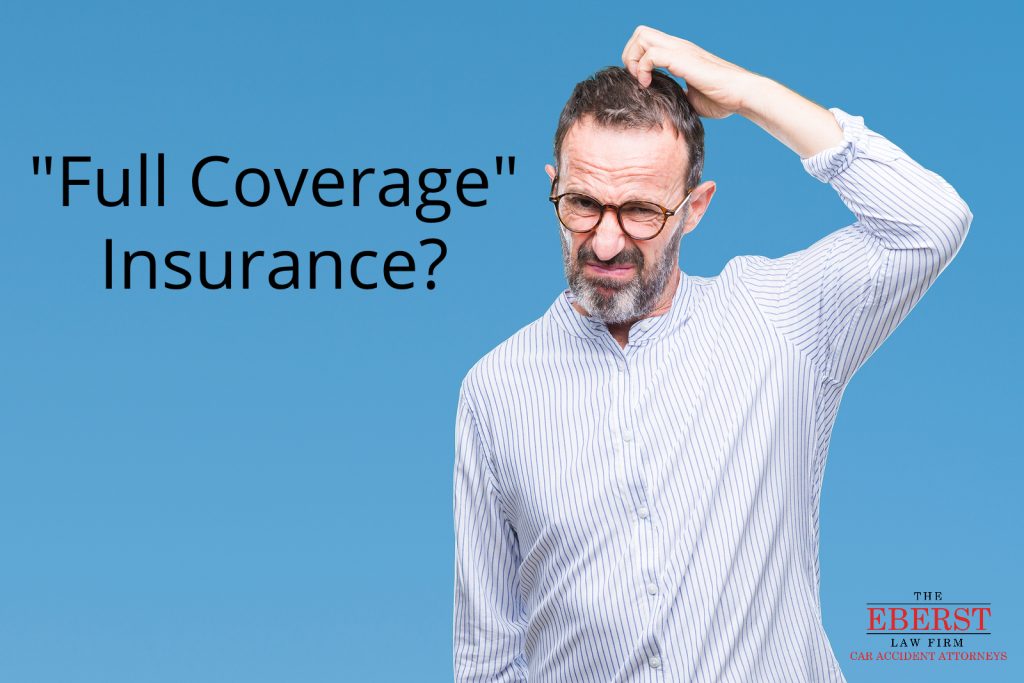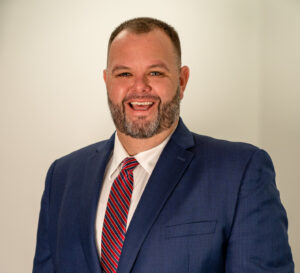 Is there really such a thing as Full Auto Insurance Coverage?
Is there really such a thing as Full Auto Insurance Coverage?
Imagine meeting with your insurance agent, requesting to have complete auto coverage in the event you are involved in a crash, and then later sustaining severe injuries in a traumatic accident to only discover that your insurance provides minimal coverage for your treatment and only pays for some of your vehicle’s repairs. “Full coverage” means different things to different consumers, and even differs amongst insurance companies and insurance agents. For this reason, amongst others, it is very important to learn about the different types of insurance coverage so that you know exactly how you will be covered in the event of an auto accident.
At The Eberst Law Firm, we would like to help you become aware and knowledgeable about the different types of auto insurance coverages so that you can elect coverages that are in line with what you would expect to be compensated for in the event you are involved in a crash.
What is the legally required auto insurance coverage in Florida?
The Florida Highway Safety & Motor Vehicles website advises, “Florida’s minimum coverage is $10,000 personal injury protection (PIP) and $10,000 property damage liability (PDL)”. PIP coverage provides payments toward one’s initial medical bills up until $10,000 is paid out, and PDL coverage pays for damages that one has caused to another person’s vehicle in a crash.
Florida is one of the only states in the entire country that doesn’t require either bodily injury coverage or uninsured/underinsured motorist coverage, both of which are coverages that are pursued through personal injury cases. At least one of these types of insurance coverage must be available for an attorney to pursue a case for a victim of a car crash in Florida. The Balance, a financial assistance website, has compiled a list of each state’s insurance requirements, as found on each state’s insurance commissioner’s websites. Florida’s leniency regarding auto insurance requirements makes it even more imperative to understand insurance terminology.
What is Florida PIP Insurance, and who/what does it cover?
PIP is the most basic insurance coverage that will pay for your injuries due to an auto accident, and this is the auto insurance information that most of your medical providers will be requesting. Your PIP is the insurance that is “first in line” when you are involved in a crash. It seems counterintuitive to some to provide their insurance company information for billing purposes when someone else was at fault for the crash, but that is the law in Florida. PIP is also known as “No Fault Insurance” as this is the coverage that all initial medical treatment must go through in Florida. Regardless of who is at fault for a crash, your treatment will first go through your own insurance company’s PIP until it is “exhausted” once the $10,000 has been paid out. It is important to remember that PIP pays out only 80% of your medical bills (and 60% of your lost wages, if you choose to use it for this).
PIP coverage applies to you, your child, members of your household, certain passengers who don’t have their own PIP insurance, so long as they don’t own a vehicle. If you are a passenger in someone else’s car involved in a crash and have your own insurance, then your PIP will cover you; on the flipside, if you have a passenger in your car and this individual has their own insurance, then their PIP will cover them. Additionally, PIP covers you if you are struck by a car as a bicyclist or pedestrian.
What does “full coverage” exclude?
Below are some types of coverages that may not be automatically included if you ask your insurance agent for “full coverage”.
- Uninsured/Underinsured motorist coverage (UM/UIM) – This is very important (and less understood) coverage, especially in the state of Florida since Bodily Injury coverage isn’t required. This coverage exclusively pays for your injuries and pain/suffering in the event of an auto accident. If if the person who hits you has no Bodily Injury coverage or only has minimal Bodily Injury coverage, your insurance company will step into place and afford coverages to you limited up to the UM/UIM coverage limits.
- Bodily Injury coverage (BI) – Florida is one of the only states that doesn’t require BI coverage. This coverage pays for injuries or death to others in the event of an auto accident and you are found to be at fault, limited to the available BI coverage limits. The name for this type of coverage is misleading to some; it is common for people to think that they themselves are protected against “bodily injuries” if they have bodily injury coverage on their policy, even though this coverage is for coverage the other party involved in a crash. *If you do not carry Underinsured/Uninsured motorist coverage and if the person who hits you does not have Bodily Injury coverage, then you typically can’t pursue an injury claim against this other driver.
- Rental car coverage – Rental coverage is helpful if you are involved in a crash and are waiting on your car to be repaired, especially if the other party’s insurance policy does not provide a rental for you. This allows you to stay in a basic rental car for a certain amount of time.
- Medical payments coverage (Medpay) – This coverage supplements your PIP coverage; PIP pays at a rate of 80% toward your initial medical bills, and Medpay typically covers the additional 20% on your initial bills, until it is exhausted. This coverage comes into play regardless of if you are at fault for a crash.
- Gap coverage – After you pay your deductible, gap coverage helps cover the gap between what you owe on your car’s loan and what your car is actually worth at the time of the crash in the event you are involved in an auto accident and are found to be not at fault. For example, imagine that you owe $10,000 on your car loan, but your car’s actual cash value (ACV) is only $7,000. This $3,000 (the $10,000 that you owe minus the $7,000 ACV) is the “gap” that your auto insurance will cover. If your car is paid off, you don’t need gap insurance; however, if you are leasing or making payments on a car loan, then this type of coverage could be very beneficial for you.
Consult with an Experienced Attorney regarding Auto Insurance Questions
As you can see, insurance terminology and concepts are not always easily delineated or understood. It is always extremely important to speak with an experienced attorney who specializes in the field of personal injury if you or a loved one have been involved in an auto accident. These unique types of claims can only be fully understood by an attorney who has handled these claims for years. The experienced attorneys at The Eberst Law Firm are here to help. Contact us online or by calling (772) 225-4900 for a free consultation.
Additional Sources for “Clarifying the Misnomer of Full Auto Coverage”
https://www.flhsmv.gov/ddl/frfaqgen.html
https://www.thebalance.com/understanding-minimum-car-insurance-requirements-2645473
https://www.nationwide.com/lc/resources/auto-insurance/articles/how-does-gap-insurance-work
